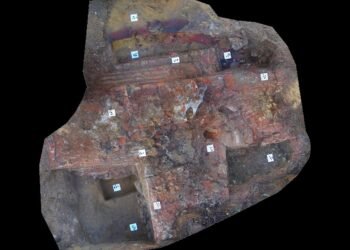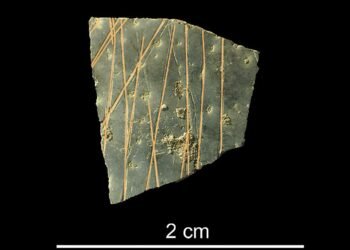Archaeologists in Inner Mongolia have unearthed a Liao Dynasty (916-1125) tomb and an accompanying chariot burial pit. This significant discovery was made in Jinbaotun Village, Dongfeng Town, Kailu County, Tongliao City, by a team from the Inner Mongolia Institute of Cultural Relics and Archaeology.

The chariot burial, measuring an impressive 7 meters in length and over 2 meters in width, is a remarkable find due to its size and preservation. Despite the decay of its wooden shaft, several iron components and gilded fittings have remained intact.
Ma Hai, director of the Kailu County Museum, said: “This is the first time such a large-scale chariot has been found in Kailu’s long history of Liao Dynasty tomb excavations. The tomb has not been disturbed by looters, so almost all the information related to the artifacts has been preserved.”
The chariot, identified as a “wenliang chariot” or ceremonial chariot burial, was used exclusively by the noble class of the Khitan during the Liao Dynasty. This type of chariot was likely employed in funeral processions, symbolizing the high status of the tomb’s occupant. “We found a wooden shaft, carriage, and most importantly, gilded bronze bells and tassels within the pit, suggesting the burial was for a noble,” said Qi Rongqing, a faculty member at the College of History and Culture, Inner Mongolia Normal University.
The excavation of the tombs began after a survey conducted in April 2023 revealed their existence. By June, a joint archaeological team, including members from the Inner Mongolia Normal University and the Kailu County Museum, started the full excavation of the site. The team uncovered more than 30 artifacts from the chariot burial pit, including silver ornaments, copper tassels, iron components, and gilded bronze bells.
In addition to the chariot pit, the archaeological team also excavated two tombs, with Tomb No. 1 being particularly noteworthy. Although classified as a medium-sized tomb, the scale and quality of the burial items suggest the tomb’s owner held significant social status.
“The use of large stones for the tomb roof, extensive mural paintings, and the inclusion of rare materials like gold, silver, agate, turquoise, and obsidian among the burial items, indicate the tomb’s owner was of high standing,” Qi explained. The tombs reflect the cultural integration and adaptation that occurred during the Liao Dynasty, as the Khitan incorporated elements of Central Plains culture, such as the use of clay bricks, especially grooved bricks, in construction.
The Khitan, known as Qidan in Chinese, were a nomadic people originating from eastern Inner Mongolia. They are first mentioned in historical records during the Northern Wei dynasty (386-534 CE), where they are described as descendants of the Xianbei peoples.
Their burial practices, while generally simpler than those found in the Central Plains, were nonetheless marked by distinct ethnic characteristics. As they established the Liao Dynasty, the Khitan began to absorb elements of Central Plains culture, blending these influences with their own traditions.
The artifacts and tomb structures not only illustrate the high status of the individuals buried there but also highlight the cultural exchanges and integration that shaped the region during this period.























